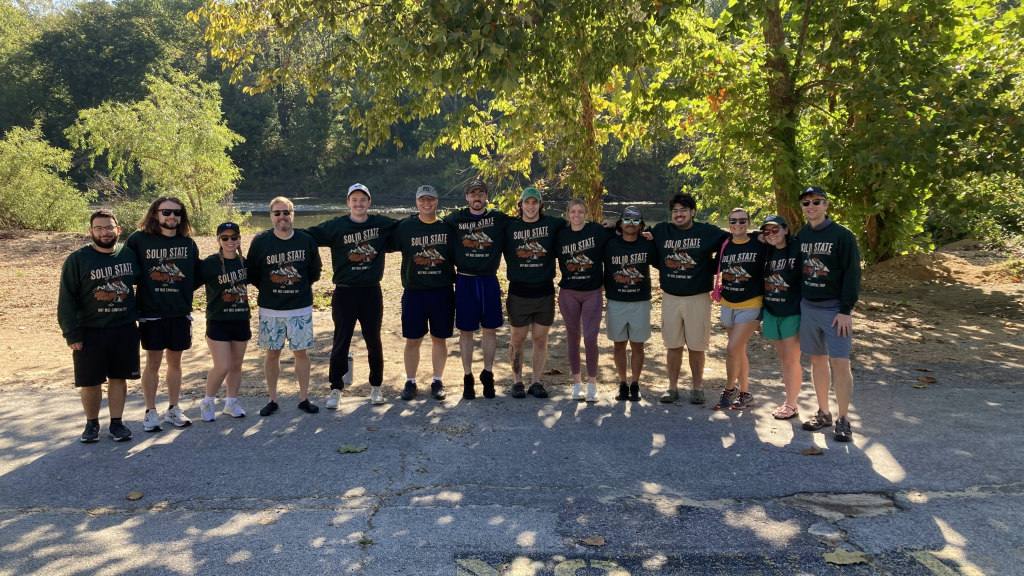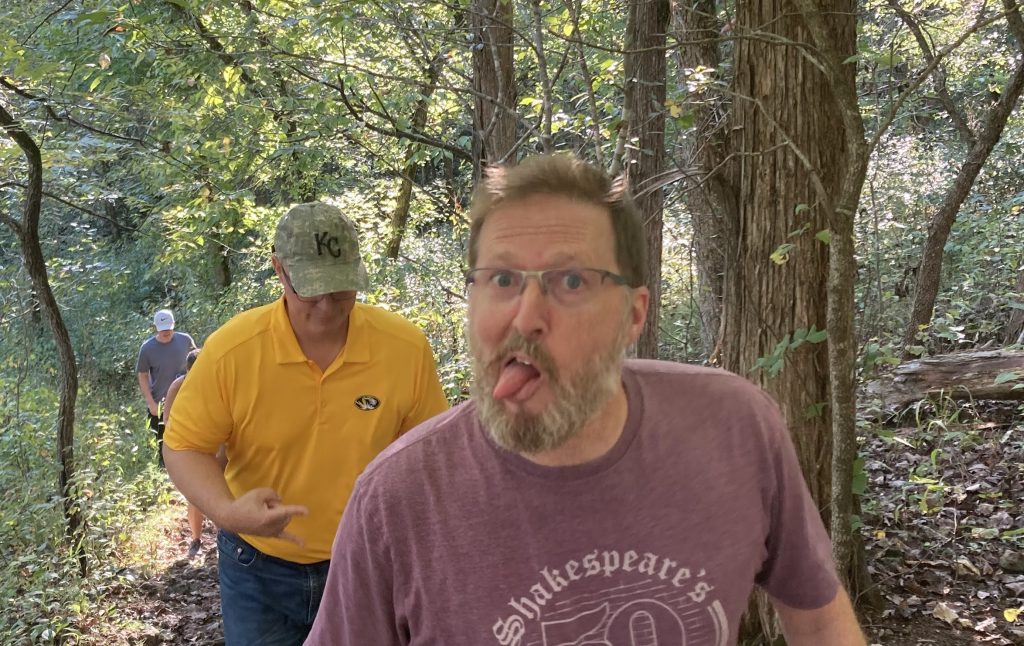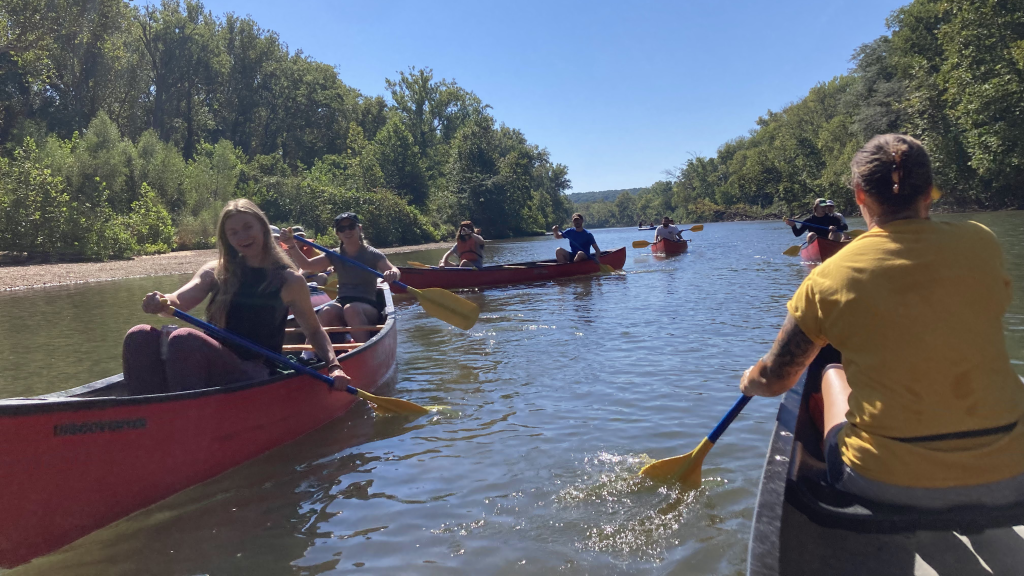October 23, 2025
Here’s light-hearted take on a real doctoral retreat and how it might look as an article in a completely fictitious academic journal.

Title: A Multidisciplinary Field Study on Team Dynamics, Experimental Problem-Solving, and Informal Knowledge Exchange in an Outdoor Setting: Satirical Observations from an Actual Mizzou Engineering Doctoral Retreat at Meramec State Park
Abstract This completely made-up study documents the outcomes of an actual structured outdoor retreat designed to foster interdisciplinary collaboration and community-building among doctoral students.
This real-world retreat really was conducted Sept. 26-27 as part of the University of Missouri’s National Science Foundation Research Traineeship (NRT) program, a five-year doctoral initiative integrating materials research, data science and analytics, and creative process.
Conducted at Meramec State Park, the retreat really did integrate recreational activities with informal scientific inquiry, providing a unique environment for observing team dynamics and experimental problem-solving.
Preliminary findings suggest that informal settings may facilitate spontaneous knowledge exchange and innovative approaches to research challenges. The retreat also highlighted areas for further investigation, particularly in practical fire-starting techniques.
1. Introduction While traditional academic retreats often emphasize structured research presentations, this study explores the efficacy of an informal, activity-based approach in promoting scholarly community and creative problem-solving.
The retreat, titled The Solid State of Adventure, was (no kidding) organized by faculty and staff of the University of Missouri College of Engineering and the College of Arts and Science and attended by 10 doctoral students.

2. Methods
2.1 Participants and Setting Participants included 10 doctoral students from diverse STEM disciplines, accompanied by faculty and staff organizers. Meramec State Park, Missouri, was selected for its natural amenities, which provided opportunities for both physical activities (e.g., hiking, canoeing [Figure 3]) and informal gatherings (e.g., campfire discussions).
2.2 Activities and Data Collection Activities were designed to minimize formal research discussions and maximize interpersonal interaction. Key components included:
- Group Hike: A guided, hour-long hike through the park, intended to encourage organic conversation and team bonding.
- Culinary Collaboration: Participants prepared hot dogs, hamburgers and s’mores using shared resources, fostering cooperation and communication (Maschmann, 2025).
- Fire-Starting Experiment: An impromptu study on the efficacy of flint-based fire ignition, conducted using locally available materials (Maschmann, 2025). Quantitative data on success rates were not recorded, but qualitative observations indicated a need for further research in this area.
- Data Science Experiment: Researchers attempted to identify patterns in responses to a 20-question survey, employing ad hoc data collection and analysis techniques.
- Materials Identification Challenge: Participants analyzed six visually similar pantry powders (e.g., flour, baking soda) using only tools available at the campsite, such as water, heat sources, and sensory evaluation.

3. Results
3.1 Team Dynamics and Community Building Preliminary observations indicated high levels of engagement and enthusiasm among participants. Despite explicit instructions to avoid research discussions, several individuals spontaneously initiated conversations about their work, suggesting that informal settings may lower barriers to interdisciplinary exchange.
3.2 Experimental Outcomes
- Fire-Starting Experiment: Attempts to ignite a fire using flint yielded inconsistent results, with success heavily dependent on individual technique (Maschmann, 2025). This underscored the need for systematic investigation into optimal fire-starting methods in outdoor settings.
- Data Science Experiment: The survey-based activity revealed challenges in identifying patterns without access to computational tools. Participants employed manual tabulation, highlighting the limitations of resource-constrained data analysis.
- Materials Identification: The powders were differentiated based on solubility, reaction to heat, and tactile properties (Young, 2025). While not rigorous, the exercise demonstrated the potential for creative problem-solving in the absence of laboratory equipment.
3.3 Anecdotal Observations Unlike the previous year’s retreat, no canoes were overturned during water-based activities [Figure 3]. While this eliminated a potential “bonding opportunity” (Young, 2025), participants expressed satisfaction with remaining dry.
4. Discussion The spontaneous emergence of research discussions, despite their discouragement, suggests that doctoral students may inherently seek opportunities to share and refine their ideas, even in non-academic contexts.
The ad hoc experiments, though not scientifically rigorous, provided valuable insights into the adaptability of researchers when faced with limited resources. The fire-starting experiment, in particular, revealed a gap in practical outdoor skills among participants, warranting further study.
5. Conclusion and Future Directions This study supports the hypothesis that informal, activity-based retreats can strengthen scholarly communities and stimulate creative problem-solving. Future retreats could incorporate structured reflections on the intersection of recreational activities and research, as well as pre-retreat workshops on practical skills (e.g., fire-starting).
Further research is needed to quantify the long-term impacts of such retreats on collaboration, productivity, and student well-being. Controlled studies comparing traditional and informal retreat formats could provide deeper insights into their relative efficacy.
Acknowledgments The authors extend their gratitude to the faculty, staff and doctoral students of Mizzou Engineering and the College of Arts and Science for their participation and enthusiasm. Special thanks to Derek Anderson, Jessica Harris, Matthew Maschmann and Matthias Young for their leadership and to Meramec State Park for hosting the research.
References Bennett, E., Garcia, C., Gopaul, C., Gutierrez Monje, E., Hanssen, T., Kuehnel, L., Mick, E., Richardson, M., Sweet, C., & Young, B. (2025). A Multidisciplinary Field Study on Team Dynamics, Experimental Problem-Solving, and Informal Knowledge Exchange in an Outdoor Setting: Satirical Observations from an Actual Mizzou Engineering Doctoral Retreat at Meramec State Park. The Journal of Mostly Serious but Occasionally Whimsical Academic Pursuits That Are Definitely Not Peer-Reviewed (But Were Really Fun to Do), 1(1), 1-12.
Are you serious about a graduate degree in engineering? Discover our master’s and PhD programs!